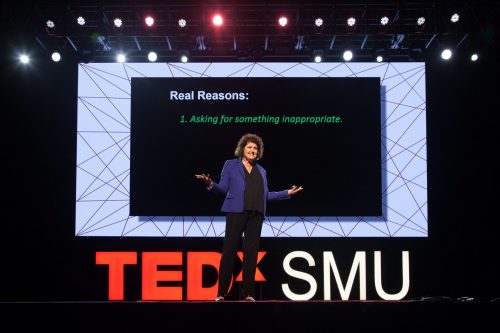JUST POSTED ONLINE!! Here’s the video of my TEDxSMU talk. Would you please watch and share it with 2 people who could benefit? Actually, would you share it with 10 to 20? (Yes, I’m asking outrageously!) The more views the better I’ll be ranked in TED’s suggested talks.
Also, here are the full survey results, Ask Outrageously Report.
Feedback from over 1,000 people provided insight into how people ask for what they want and why people say “no” to the requests of others.
Guess what? Your results could dramatically improve if you knew and used a few simple secrets. Most don’t involve more work. They just involve more asking.
Secret: MOST of us do not prepare or make requests in the best way to get a positive response. In fact, what we believe and where we focus our efforts does not correlate with the reasons why people tell us “no.” We fail to ask for the right things from the right people.
Want to know the number one answer research participants gave to feel more comfortable asking for something? “Know all the details or have done my research.” When given the option to pick three out of twelve possible choices, 69% of those who took the survey picked this answer. However, it’s not where people who can say “yes” or “no” would suggest you concentrate.
Respondents said they believe others say “no” to what they ask because the other person:
Believes the timing is wrong.
Lacks all the information needed.
Doesn’t want to spend the money.
But, these are not the main reasons people say they deny your requests. Would you believe the reasons people said they say “no” weren’t even identified as important by those making requests? In fact, the top two reasons were the two least chosen when asked why askers thought they were turned down; less than one in twenty (5%) selected either of those identified reasons.
People report that they are likely to say “no” to someone’s request if the other person:
Is asking for something inappropriate.
Is someone I don’t like, respect or trust.
Can’t respond intelligently to questions about their request.
What do the responses mean for you when you ask in the future?
Make sure your request is appropriate. Ask yourself, “Am I asking the right person for something he or she could give me? Is this a request that makes sense for this situation? Does this person have the authority to grant my request?”
Understand the needs of people who can grant your requests. Ask yourself, “What would this person want in exchange? Why or what are their good reasons? What could I do that would help this person know they can trust me? What would help them know I respected them?”
Consider the questions you would have in their shoes. Ask yourself, “What would I want to know if I had to respond to this request? How would I want to receive this information? How would this affect me if I was in this role? What would granting this request mean to someone’s group, or organization?”
Seek the right information first. Ask others who made similar requests for insights and suggestions how your requests would be received. Ask a potential decision maker if you are following the right procedure. Ask, “What would you want to know before making your decision? How would you like to receive more information?”
Thank you to everyone who participated in the research for my TEDxSMU talk and future book. I’ll share more of your insights next month!
Journey On and Ask Outrageously
P.S. Last month I revealed a story about my epic failure to ask for a picture with Jay Leno at the Tonight’s Show. Next month, I’ll tell you how I asked outrageously and finally got that photo!
About Linda: A recognized authority on negotiations, workplace issues and strategic communication, Linda Swindling, JD, CSP is an author, media expert, a “recovering” employment attorney, and a professional speaker. Contact us to book Linda to speak at your event.
